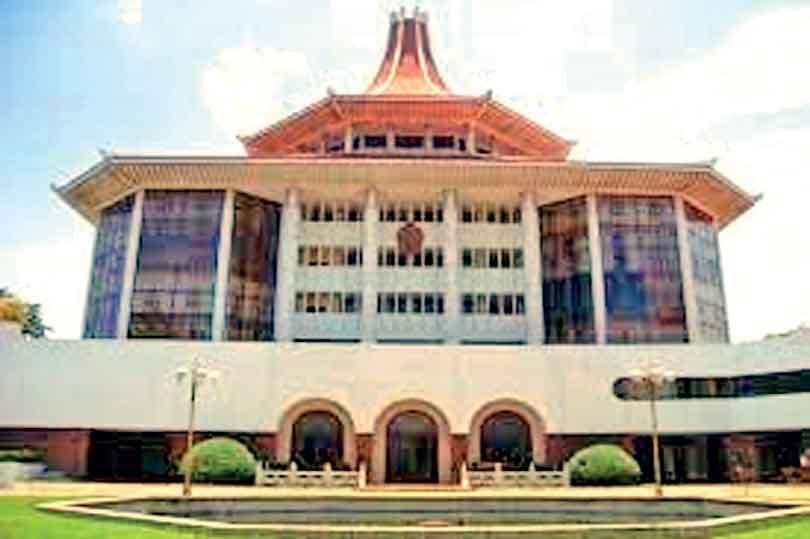26 Oct 2023 - {{hitsCtrl.values.hits}}

Judges are supposed to be men of fortitude able to survive in a hardy climate. Therefore the Independence of the Judiciary is basic and needs no rhetoric to drive home the point
 Public concerns about the independence of the Judiciary in Sri Lanka were the focus of a recent conference of the Lawyers Collective. Following certain statements made by the executive and in Parliament the Lawyers Collective asserted that the independence of the Judiciary is at stake and that unless action is taken the sovereignty of the people would be at stake
Public concerns about the independence of the Judiciary in Sri Lanka were the focus of a recent conference of the Lawyers Collective. Following certain statements made by the executive and in Parliament the Lawyers Collective asserted that the independence of the Judiciary is at stake and that unless action is taken the sovereignty of the people would be at stake
The sovereignty of the people is explained in Article 4 of the Constitution as being exercised by the different organs of the Government based on the principle of separation of powers. In a robust democracy, the principle of separation of powers is strongly adhered to.
Whether the statements attributed to the President and the Speaker amount to a threat to the independence of the Judiciary should be examined in line with the doctrine of separation of powers
The statement made by the President that only the Parliament holds authority over Government fiscal control is a statement of hard fact as stated under Article 148 of the Constitution.
The Lawyers Collective particularly referred to a case in early 2023 when a matter was pending before the Supreme Court on the restructuring of domestic debt and the Speaker in recognition of the fact that Parliament has full control of public finance ruled that it was beyond the jurisdiction of the court.
It has also been stated that the Supreme Court had in March 2023 issued an order for the Secretary to the Treasury to release money for a Local Government election.
A cursory glance at the Appropriation Act of 2023 does not show that the required amount of money has been allocated to the Elections Department by Parliament.
Subsequently, the same judge who issued this order had stayed the earlier order. It is not clear on what grounds the earlier order was suspended, but to imply that the learned judge succumbed to some kind of pressure is a gross insult to him.
It had also been reported at the conference that the budget estimates are not a law or a legal document and that it is only a summary of the Appropriation Bill to assist the Parliament.
This is factually incorrect. The estimates form part of the schedule for the Appropriation Bill and when passed by Parliament become a part of the law.
The ruling of the Speaker that no court can issue orders in judgments against a resolution passed by Parliament is but a reflection of Section 3 of the Parliament Powers and Privileges Act according to which no court is entitled to question or impeach the proceedings in the House.
The Law of Parliamentary Privilege in Sri Lanka is founded on the law in the UK. It is a cornerstone of the principle of separation of powers and forms the basis of democracy.
Its genesis can be traced back to the conflict between the Parliament and the Judiciary following the case of Stockdale vs Hansard where the official reporter of the Parliament had to pay a grievous price for adhering to the orders of his great masters in the House of Commons. It is in recognition of this principle that in 2001 when our Supreme Court issued a Stay Order to restrain the Speaker from appointing a Select Committee to inquire into the conduct of a former Chief Justice consequent to a motion of impeachment against him the Speaker rejected the order and affirmed that such matters were exclusively within the jurisdiction
of Parliament.
Similarly, in the case of Gomes vs M.H Mohamed, where citizen Gomes sought writs of Certiorari and Mandamus against the Speaker requiring him to continue entertaining a motion of impeachment against the President, it was stated by the Court of Appeal that they were proceedings in Parliament and the courts were precluded from examining
those matters.
Thus the courts have upheld the Right of Parliament to take Exclusive Cognisance of its proceedings.
Therefore each branch of the Government exercises supremacy in relation to its Constitutional duties.
The supremacy of the Supreme Court ends where the supremacy of the
Parliament begins.
If the Supreme Court arrogate to itself the powers of the Executive it violates the principle of separation of powers. Similarly, courts cannot function as a super-legislature. Neither can Parliament nor the Executive exercise judicial powers.
No one organ of the Government should usurp the function of the other. Nor should there be abdication which will upset the separation of powers.
If the judge accepts political patronage or fails to do the correct thing in fear of adverse consequences the fault is with the Judge.
Judges are supposed to be men of fortitude able to survive in a hardy climate. Therefore the Independence of the Judiciary is basic and needs no rhetoric to drive home the point.
26 Dec 2024 13 minute ago
26 Dec 2024 1 hours ago
26 Dec 2024 1 hours ago
26 Dec 2024 2 hours ago
26 Dec 2024 2 hours ago